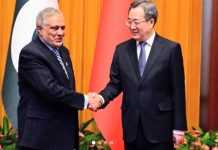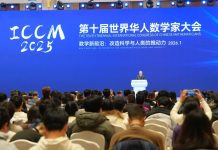BEIJING: One of the world’s most important bilateral relations is at a critical crossroads, with the decision likely to shape the global political and economic landscape in the coming years.
After the end of the four-year Trump administration, during which Sino-U.S. relations ran into the most difficult period since their establishment of diplomatic relations in the 1970s, a window of opportunities now arises to bring rationality back to bilateral relations.
Could the United States tolerate and cooperate with an expanding economy nearing its size?
China sent a clear message at the beginning of this year, which marks the 50th anniversary of Dr. Henry Kissinger’s ice-breaking secret trip to Beijing. Chinese State Councilor and Foreign Minister Wang Yi called on the new U.S. administration to “restore normalcy to the bilateral relations and restart cooperation” in an interview.
But whether China-U.S. relations could return on track depends on the new U.S. administration. It must respect the red lines in bilateral relations and seize fresh opportunities to cooperate in many fields, such as battling climate change.
To some extent, the relations between the world’s top two economies are analogous to the ancient Chinese philosophical ideas of “Yin Yang.” The concept of dualism describes how forces in seemingly stark difference may actually be interconnected and interdependent.
That paradoxical relationship, deeply rooted in the Chinese culture and embodied in diplomatic rhetoric such as the “cooperative competition” between China and the United States proposed by Chinese former Vice Foreign Minister Fu Ying last year, is a vision with fundamental differences compared with the Huntingtonian “clash of civilizations.” With Sino-U.S. relations reaching a place with new possibilities, at least some notes are relevant. Consensus could first be built upon broad principles such as tough rhetoric is no substitute for a clear vision of Sino-U.S. relations and there is no question that cooperation is conducive to the two major countries and the world. Washington should also be aware that it would get nowhere if it makes changing the Chinese government system the ultimate goal in formulating its policy toward China. The U.S. government must face and acknowledge that the Chinese system has a legitimate basis for existence and is supported by the Chinese people. Blatant attacks on the system will be inevitably counterproductive.
Examining China-U.S. relations requires a comprehensive look at history and reality. Chen Wenxin, deputy director of the Institute of American Studies, China Institutes of Contemporary International Relations, believes that after the dialogue “pause button” was pressed between the two countries, the bilateral relationship needs a reset. “Biden’s presidency might provide a fresh opportunity to rebuild Sino-U.S. relations, which need to be ‘normalized’ again,” Chen said. “But the control of differences and respecting each other’s core interests are prerequisites.”
The last time Sino-U.S. relations underwent “normalization,” the United States pledged to respect the “one-China principle,” now the international consensus and political foundation of China’s diplomatic relations with other countries, and terminated its official ties with Taiwan. – Agencies






